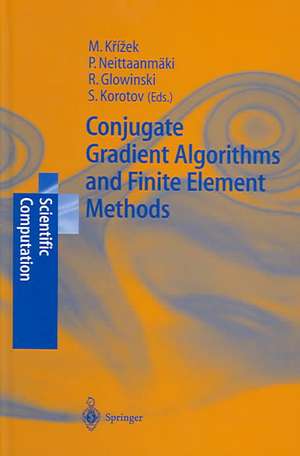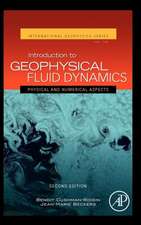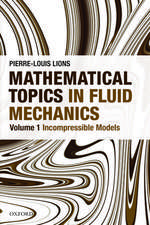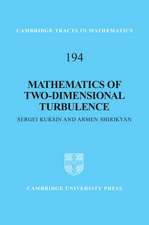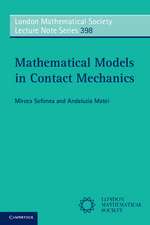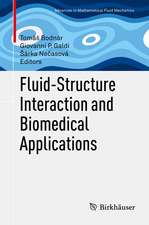Conjugate Gradient Algorithms and Finite Element Methods: Scientific Computation
Editat de Michal Krizek, Pekka Neittaanmäki, Roland Glowinski, Sergey Korotoven Limba Engleză Hardback – 11 iun 2004
Via their combinations practitioners have been able to solve complicated, direct and inverse, multidemensional problems modeled by ordinary or partial differential equations and inequalities, not necessarily linear, optimal control and optimal design being part of these problems.
The aim of this book is to present both methods in the context of complicated problems modeled by linear and nonlinear partial differential equations, to provide an in-depth discussion on their implementation aspects. The authors show that conjugate gradient methods and finite element methods apply to the solution of real-life problems. They address graduate students as well as experts in scientific computing.
| Toate formatele și edițiile | Preț | Express |
|---|---|---|
| Paperback (1) | 645.60 lei 6-8 săpt. | |
| Springer Berlin, Heidelberg – noi 2012 | 645.60 lei 6-8 săpt. | |
| Hardback (1) | 653.98 lei 6-8 săpt. | |
| Springer Berlin, Heidelberg – 11 iun 2004 | 653.98 lei 6-8 săpt. |
Din seria Scientific Computation
- 18%
 Preț: 1021.05 lei
Preț: 1021.05 lei - 18%
 Preț: 743.27 lei
Preț: 743.27 lei - 18%
 Preț: 889.75 lei
Preț: 889.75 lei - 18%
 Preț: 1108.51 lei
Preț: 1108.51 lei -
 Preț: 387.96 lei
Preț: 387.96 lei - 20%
 Preț: 902.00 lei
Preț: 902.00 lei -
 Preț: 400.85 lei
Preț: 400.85 lei -
 Preț: 386.61 lei
Preț: 386.61 lei - 15%
 Preț: 654.62 lei
Preț: 654.62 lei -
 Preț: 380.25 lei
Preț: 380.25 lei - 18%
 Preț: 1111.34 lei
Preț: 1111.34 lei -
 Preț: 452.62 lei
Preț: 452.62 lei -
 Preț: 389.31 lei
Preț: 389.31 lei - 18%
 Preț: 950.03 lei
Preț: 950.03 lei - 15%
 Preț: 649.22 lei
Preț: 649.22 lei - 15%
 Preț: 595.86 lei
Preț: 595.86 lei - 18%
 Preț: 942.63 lei
Preț: 942.63 lei - 15%
 Preț: 505.18 lei
Preț: 505.18 lei -
 Preț: 389.70 lei
Preț: 389.70 lei - 15%
 Preț: 653.00 lei
Preț: 653.00 lei - 18%
 Preț: 957.44 lei
Preț: 957.44 lei - 15%
 Preț: 643.99 lei
Preț: 643.99 lei - 15%
 Preț: 649.39 lei
Preț: 649.39 lei -
 Preț: 388.13 lei
Preț: 388.13 lei - 18%
 Preț: 958.38 lei
Preț: 958.38 lei - 18%
 Preț: 1129.52 lei
Preț: 1129.52 lei - 18%
 Preț: 967.56 lei
Preț: 967.56 lei - 15%
 Preț: 700.75 lei
Preț: 700.75 lei -
 Preț: 401.03 lei
Preț: 401.03 lei - 15%
 Preț: 597.99 lei
Preț: 597.99 lei -
 Preț: 385.62 lei
Preț: 385.62 lei -
 Preț: 394.87 lei
Preț: 394.87 lei -
 Preț: 385.08 lei
Preț: 385.08 lei - 18%
 Preț: 1106.63 lei
Preț: 1106.63 lei - 15%
 Preț: 504.17 lei
Preț: 504.17 lei - 15%
 Preț: 596.36 lei
Preț: 596.36 lei - 15%
 Preț: 653.98 lei
Preț: 653.98 lei
Preț: 653.98 lei
Preț vechi: 769.39 lei
-15% Nou
Puncte Express: 981
Preț estimativ în valută:
125.14€ • 130.40$ • 103.61£
125.14€ • 130.40$ • 103.61£
Carte tipărită la comandă
Livrare economică 03-17 aprilie
Preluare comenzi: 021 569.72.76
Specificații
ISBN-13: 9783540213192
ISBN-10: 3540213198
Pagini: 404
Ilustrații: XV, 384 p.
Dimensiuni: 155 x 235 x 30 mm
Greutate: 0.79 kg
Ediția:2004
Editura: Springer Berlin, Heidelberg
Colecția Springer
Seria Scientific Computation
Locul publicării:Berlin, Heidelberg, Germany
ISBN-10: 3540213198
Pagini: 404
Ilustrații: XV, 384 p.
Dimensiuni: 155 x 235 x 30 mm
Greutate: 0.79 kg
Ediția:2004
Editura: Springer Berlin, Heidelberg
Colecția Springer
Seria Scientific Computation
Locul publicării:Berlin, Heidelberg, Germany
Public țintă
ResearchCuprins
The founders of the conjugate gradient method.- Conjugate gradients and finite elements — a golden jubilee.- Geometric interpretations of conjugate gradient and related methods.- The convergence of Krylov methods and Ritz values.- An application of the Shermann-Morrison formula to the GMRES method.- A parallel CG solver based on domain decomposition and non-smooth aggregation.- Deflation in preconditioned conjugate gradient methods for finite element problems.- Nonsmooth equation method for nonlinear nonconvex optimization.- Nonstandard nonobtuse refinements of planar triangulations.- Acute versus nonobtuse tetrahedralizations.- A posteriori eror estimation of “quantities of interest” on “quantity-adapted meshes”.- Inversion of block-tridiagonal matrices and nonnegativity preservation in the numerical solution of linear parabolic PDEs.- On the nonnegativity conservation in semidiscrete parabolic problems.- Iterative solution methods of the Maxwell equations using staggered grid spatial discretization.- Iterative solution of linear variational problems in Hilbert spaces: Some conjugate gradients success stories.- On the application of preconditioning operators for nonlinear elliptic problems.- On a conjugate gradient/Newton/penalty method for the solution of obstacle problems. Application to the solution of an eikonal system with Dirichlet boundary conditions.- The use of bilinear rectangular elements in reconstruction of panoramic images.- Finite element discretization and iterative solution techniques for multiphase flows in gas-liquid reactors.- Implicit flux-corrected transport algorithm for finite element simulation of the compressible Euler equations.- Application of the PCG method in solution of a nuclear reactor criticality problem.
Textul de pe ultima copertă
The position taken in this collection of pedagogically written essays is that conjugate gradient algorithms and finite element methods complement each other extremely well. Via their combinations practitioners have been able to solve differential equations and multidimensional problems modeled by ordinary or partial differential equations and inequalities, not necessarily linear, optimal control and optimal design being part of these problems. The aim of this book is to present both methods in the context of complicated problems modeled by linear and nonlinear partial differential equations, to provide an in-depth discussion on their implementation aspects. The authors show that conjugate gradient methods and finite element methods apply to the solution of real-life problems. They address graduate students as well as experts in scientific computing.
Caracteristici
Includes supplementary material: sn.pub/extras
